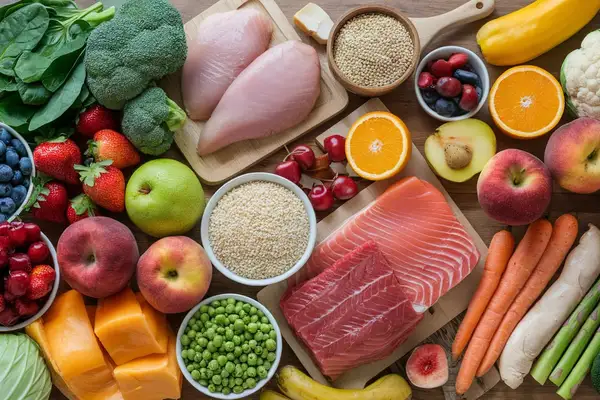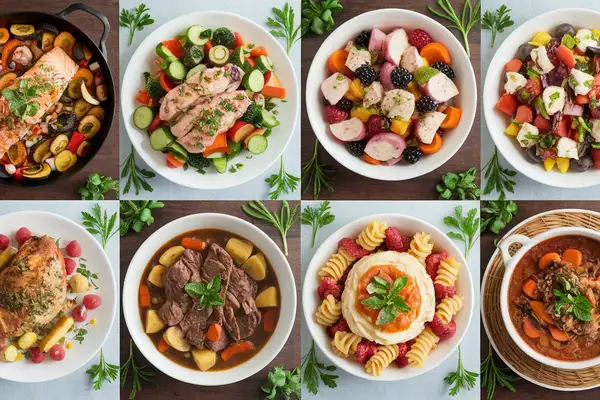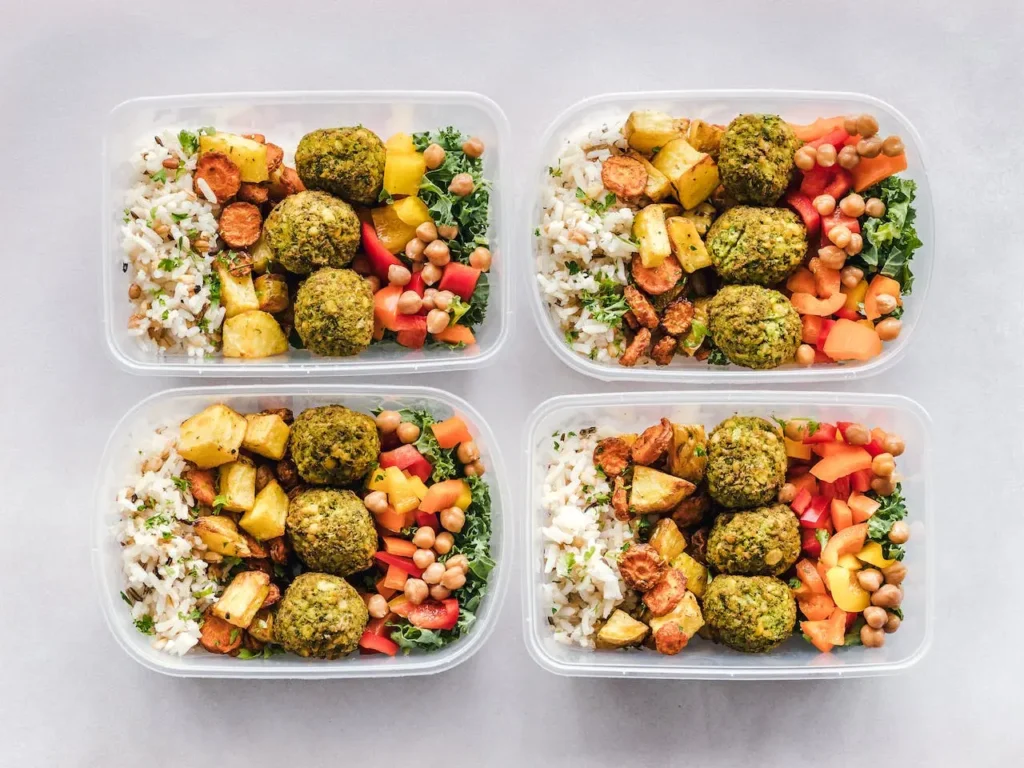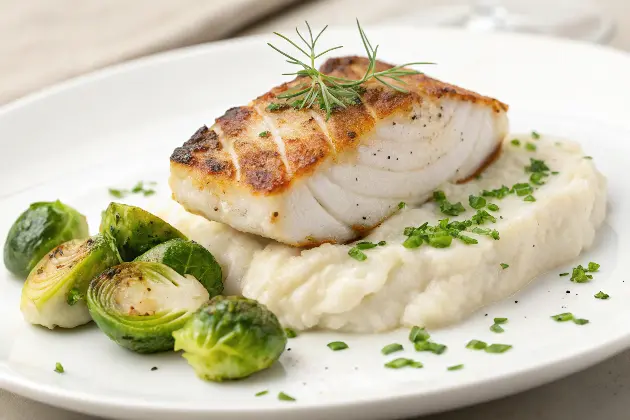7-Day Meal Plan to Lower Cholesterol: Soluble Fiber Foods That Lower Cholesterol
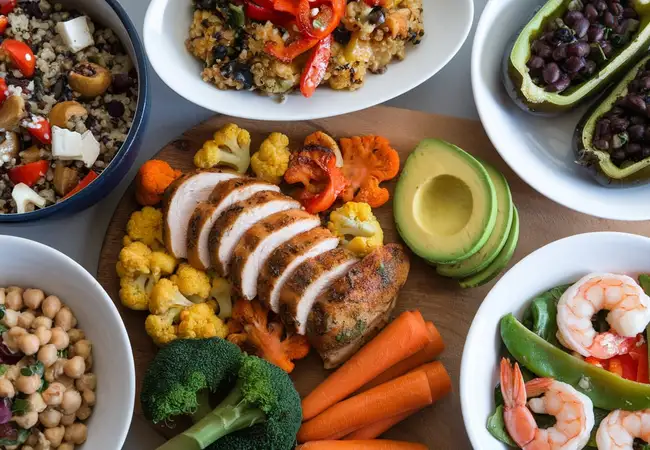
What is Cholesterol?
This post may contain affiliate links, meaning I may earn a commission if you make a purchase, at no extra cost to you. I only recommend products I trust. Thank you for your support.
Cholesterol is a waxy substance found in your blood that’s necessary for building healthy cells.
However, when cholesterol levels become too high, it can lead to the formation of fatty deposits in your blood vessels, increasing your risk of heart disease and stroke.
There are two main types of cholesterol:
- LDL (Low-Density Lipoprotein) – Often referred to as “bad” cholesterol, as it can build up in your arteries.
- HDL (High-Density Lipoprotein) – Known as “good” cholesterol, as it helps remove other forms of cholesterol from your bloodstream.
The goal of a low cholesterol diet plan is to reduce LDL levels while maintaining or increasing HDL levels.
Lowering cholesterol involves choosing foods that are high in fiber, low in saturated fats, and rich in healthy fats, which all work together to support heart health.
In this 7-day meal plan to lower cholesterol, we’ll focus on delicious, heart-friendly low cholesterol meals and also provide you with tips on how to lower cholesterol, and a detailed list of foods that lower cholesterol naturally.
Foods That Lower Cholesterol
Incorporating a variety of soluble fiber foods into your diet can help manage cholesterol levels and support overall heart health.
Here’s a detailed list of low cholesterol foods:
1. Fruits
- Apples: Rich in pectin, which can lower cholesterol levels.
- Berries: Strawberries, blueberries, and raspberries contain antioxidants and fiber.
- Citrus Fruits: Oranges, lemons, and grapefruits are high in pectin and vitamin C.
- Avocados: High in monounsaturated fats, which can help lower LDL cholesterol.
- Bananas: Provide soluble fiber that can help manage cholesterol.
- Kiwis: High in vitamin C and soluble fiber.
2. Vegetables
- Leafy Greens: Spinach, kale, and collard greens are high in fiber and antioxidants.
- Cruciferous Vegetables: Broccoli, Brussels sprouts, and cauliflower contain fiber and phytochemicals.
- Carrots: Rich in soluble fiber, which can help reduce cholesterol levels.
- Beets: Contain antioxidants and help lower blood pressure, supporting heart health.
- Sweet Potatoes: High in fiber and vitamins, providing heart-healthy nutrients.
3. Whole Grains
- Oats: Contain beta-glucan, a soluble fiber that reduces LDL cholesterol.
- Barley: Another whole grain rich in beta-glucan.
- Brown Rice: Provides fiber and can help maintain heart health.
- Quinoa: A complete protein that contains fiber and healthy fats.
- Whole Wheat Products: Whole-grain bread and pasta provide more fiber than refined versions.
4. Legumes and Pulses
- Chickpeas: High in fiber and protein, helping to lower cholesterol.
- Lentils: Rich in soluble fiber and protein.
- Black Beans: Provide fiber and plant-based protein.
- Kidney Beans: Contain soluble fiber and various vitamins.
- Peas: High in fiber and help in lowering cholesterol levels.
5. Nuts and Seeds
- Walnuts: Rich in omega-3 fatty acids and healthy fats.
- Almonds: Contain monounsaturated fats and fiber.
- Chia Seeds: High in omega-3s and soluble fiber.
- Flaxseeds: Provide lignans and omega-3 fatty acids.
- Pumpkin Seeds: Rich in fiber, plant sterols, and heart-healthy fats.
6. Healthy Fats
- Olive Oil: High in monounsaturated fats, it can help lower LDL cholesterol.
- Canola Oil: Contains omega-3 fatty acids and is low in saturated fats.
- Avocado Oil: Rich in monounsaturated fats and vitamin E.
- Nut Butters: Almond butter and peanut butter contain healthy fats and protein.
7. Fish and Seafood
- Fatty Fish: Salmon, mackerel, sardines, and trout are rich in omega-3 fatty acids, which can lower triglycerides and cholesterol levels.
- Shellfish: Shrimp and crab contain low levels of saturated fat.
8. Dairy Alternatives
- Almond Milk: Lower in saturated fats compared to cow’s milk.
- Soy Milk: Contains isoflavones that may help lower cholesterol.
- Coconut Yogurt: Often lower in saturated fat than dairy yogurt.
9. Herbs and Spices
- Garlic: May help lower cholesterol and improve heart health.
- Turmeric: Contains curcumin, which has anti-inflammatory properties.
- Ginger: May help reduce cholesterol levels and inflammation.
- Cinnamon: Known to help reduce cholesterol and improve blood sugar levels.
10. Dark Chocolate
- Dark Chocolate (70% cocoa or higher): Contains flavonoids that can help improve heart health when consumed in moderation.
11. Beverages
- Green Tea: Contains catechins that may help lower cholesterol levels.
- Black Tea: May also have cholesterol-lowering effects.
- Red Wine (in moderation): Contains antioxidants that may benefit heart health.
12. Other Foods
- Fermented Foods: Yogurt and kefir contain probiotics that can help maintain gut health, potentially impacting cholesterol levels.
- Plant Sterols and Stanols: Fortified foods, such as certain margarine, orange juice, and yogurt drinks, can help reduce cholesterol absorption.
Foods to Avoid to Lower Cholesterol
By avoiding or limiting these foods, you can better manage your cholesterol levels and support your overall heart health.
Here’s a detailed list of foods to avoid or limit in order to help lower cholesterol levels, arranged by categories for clarity:
1. Saturated Fats
These fats can raise LDL (bad) cholesterol levels. Limit these foods:
- Fatty Cuts of Meat:
- Beef (especially processed meats like sausages and bacon)
- Pork (such as fatty pork chops and ribs)
- Lamb
- Full-Fat Dairy Products:
- Whole milk and cream
- Cheese (especially hard cheeses)
- Butter and cream cheese
- Ice cream
2. Trans Fats
Trans fats can significantly raise LDL cholesterol while lowering HDL (good) cholesterol. Avoid these foods:
- Partially Hydrogenated Oils: Found in many processed foods.
- Fried Foods: Such as fried chicken, doughnuts, and french fries.
- Baked Goods: Store-bought pastries, cookies, cakes, and pie crusts.
- Margarine: Especially stick margarine, which often contains trans fats.
3. Processed and Refined Carbohydrates
These can contribute to weight gain and increased cholesterol levels. Limit these foods:
- White Bread and Pastries: Made with refined flour.
- Sugary Cereals: High in sugar and low in fiber.
- Pasta: Especially made with refined flour.
- Snack Foods: Chips, crackers, and other processed snacks high in refined carbs and unhealthy fats.
4. Sugary Foods and Beverages
High sugar intake can lead to weight gain and increased cholesterol. Limit these foods:
- Soda and Sweetened Beverages: Soft drinks, sweetened teas, and energy drinks.
- Candy and Sweets: High in sugar and often low in nutrients.
- Desserts: Cakes, cookies, and other sugary treats.
5. Highly Processed Foods
These often contain unhealthy fats, sugars, and additives. Avoid these foods:
- Fast Food: Burgers, fried chicken, and other fast-food items.
- Pre-Packaged Meals: Often high in sodium, sugars, and unhealthy fats.
- Processed Meats: Such as hot dogs, salami, and lunch meats that contain preservatives and unhealthy fats.
6. High-Sodium Foods
Excess sodium can contribute to high blood pressure, which is a risk factor for heart disease. Limit these foods:
- Canned Soups and Vegetables: Often contain added salt.
- Soy Sauce and Other Condiments: High in sodium.
- Pickled Foods: Often have added salt.
7. Certain Cooking Oils
While some oils are healthy, others can raise cholesterol levels. Avoid or limit these foods:
- Palm Oil: High in saturated fat.
- Coconut Oil: Also high in saturated fat, though it has some health benefits when used in moderation.
8. Alcohol
While moderate consumption of certain types of alcohol may have heart health benefits, excessive drinking can lead to high cholesterol and triglyceride levels. Limit:
- Heavy Drinking: Regularly consuming large amounts of alcohol can contribute to heart disease.
9. Foods High in Cholesterol
While dietary cholesterol’s impact on blood cholesterol varies by individual, some people may benefit from reducing the intake of high cholesterol foods:
- Egg Yolks: High in cholesterol; consider limiting if you are sensitive to dietary cholesterol.
- Organ Meats: Such as liver and kidney.
7-Day Meal Plan to Lower Cholesterol
This 7-day meal plan to lower cholesterol is packed with low cholesterol meals and features heart healthy foods that are known to reduce cholesterol levels.
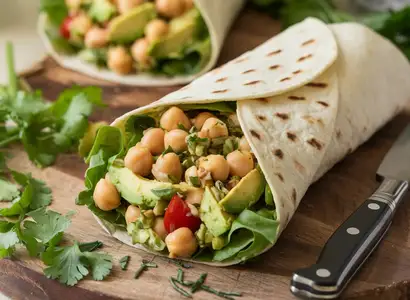
Day 1
Breakfast:
- Overnight Oats with Berries and Almonds: Oats are rich in beta-glucan, a fiber that can reduce LDL cholesterol. Oats (1/2 cup), almond milk (1 cup), fresh berries (1/2 cup), sliced almonds (1 tbsp)
Lunch:
- Avocado and Chickpea Salad Wrap: Chickpeas are high in fiber, and avocados provide healthy fats to support cholesterol management. 1 whole-wheat wrap, mashed avocado (1/2), chickpeas (1/2 cup), diced cucumber (1/4 cup), diced tomato (1/4 cup), spinach leaves (1/2 cup)
Dinner:
- Grilled Salmon with Steamed Asparagus and Quinoa: Salmon is a great source of omega-3s, which can help lower triglycerides and LDL cholesterol. Salmon fillet (4 oz), asparagus spears (1 cup), cooked quinoa (1/2 cup), olive oil (1 tsp), lemon juice (1 tsp)
Snacks:
- Apple Slices with Almond Butter: Apples are high in pectin, a type of soluble fiber that helps lower cholesterol. Apple (1 medium, sliced), almond butter (1 tbsp)
- Walnuts and Blueberries: Walnuts are rich in omega-3s, and blueberries offer antioxidants that support heart health. Walnuts (1/4 cup), fresh blueberries (1/2 cup)
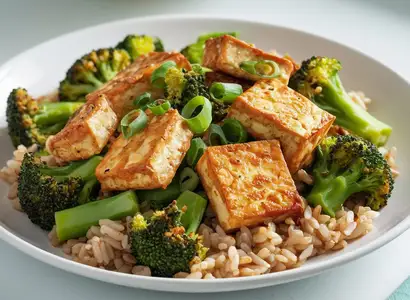
Day 2
Breakfast:
- Greek Yogurt with Flaxseeds and Sliced Banana: Flaxseeds are rich in ALA, which is linked to heart health benefits. Greek yogurt (1 cup), ground flaxseeds (1 tbsp), banana (1 medium, sliced)
Lunch:
- Spinach and Lentil Soup: Lentils are high in soluble fiber, perfect for a low cholesterol diet. Fresh spinach (1 cup), cooked lentils (1/2 cup), diced carrots (1/4 cup), diced onion (1/4 cup), minced garlic (1 clove), low-sodium vegetable broth (2 cups)
Dinner:
- Stir-Fried Tofu with Broccoli and Brown Rice: Tofu contains plant sterols that can help reduce cholesterol absorption. Firm tofu (3 oz, cubed), broccoli florets (1 cup), cooked brown rice (1/2 cup), low-sodium soy sauce (1 tbsp), sesame oil (1 tsp)
Snacks:
- Carrot Sticks with Hummus: Carrots are high in fiber, and hummus provides cholesterol lowering plant sterols. Carrot sticks (1 cup), hummus (2 tbsp)
- Cucumber Slices with Guacamole: Avocado in guacamole offers monounsaturated fats that can help lower LDL cholesterol. Cucumber slices (1 cup), guacamole (2 tbsp)
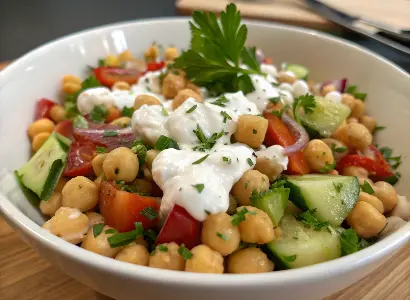
Day 3
Breakfast:
- Chia Seed Pudding with Fresh Mango: Chia seeds are high in fiber and healthy omega-3 fatty acids. Chia seeds (2 tbsp), almond milk (1 cup), fresh mango cubes (1/2 cup)
Lunch:
- Mediterranean Chickpea Bowl: Olive oil provides monounsaturated fats that can lower LDL cholesterol. Chickpeas (1/2 cup), mixed greens (1 cup), cherry tomatoes (1/4 cup), diced cucumber (1/4 cup), olives (1 tbsp), olive oil (1 tsp), lemon juice (1 tsp)
Dinner:
- Baked Cod with Sweet Potato and Green Beans: Cod is a lean protein with minimal saturated fat, and sweet potatoes are fiber-rich vegetables. Cod fillet (4 oz), sweet potato (1 small, cubed), green beans (1 cup), olive oil (1 tsp)
Snacks:
- Slices with Pistachios: Oranges provide vitamin C and fiber, and pistachios add cholesterol lowering plant sterols. Orange (1 medium, sliced), unsalted pistachios (1/4 cup)
- Sticks with Tahini: Tahini is rich in plant sterols that help reduce cholesterol absorption. Celery sticks (1 cup), tahini (1 tbsp)
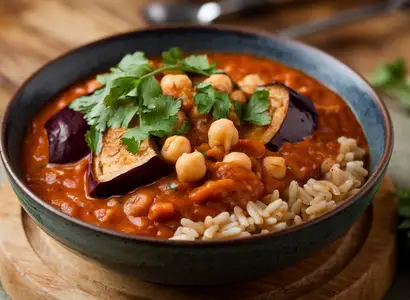
Day 4
Breakfast:
- Smoothie with Spinach, Apple, and Ginger: Apples contain pectin, a soluble fiber that can help lower cholesterol and ginger can reduce triglycerides and lower cholesterol levels. Fresh spinach (1 cup), apple (1 medium, sliced), fresh ginger (1 tsp, grated), water or almond milk (1 cup)
Lunch:
- Turkey and Avocado Lettuce Wraps: Choosing lean meats like turkey helps avoid saturated fats. Sliced turkey breast (3 oz, low-sodium), avocado (1/2, sliced), large lettuce leaves (2), sliced tomato (1/4 cup)
Dinner:
- Eggplant and Chickpea Stew with Brown Rice: Chlorogenic acid found in eggplants helps to lower LDL cholesterol levels while chickpeas are high in fiber, low in sodium, and cholesterol free. Eggplant (1 cup, cubed), chickpeas (1/2 cup), diced tomatoes (1/2 cup), diced onion (1/4 cup), cooked brown rice (1/2 cup), olive oil (1 tsp)
Snacks:
- Pear with a Handful of Almonds: Pears are high in fiber and antioxidants and almonds are full of healthy fats and sterols that help in cholesterol lowering. Pear (1 medium), almonds (1/4 cup)
- Kale Chips with Nutritional Yeast: Kale is high in fiber which helps lower LDL cholesterol and blood pressure, and nutritional yeast provides fiber and vitamins. Kale leaves (1 cup, baked), nutritional yeast (1 tbsp)
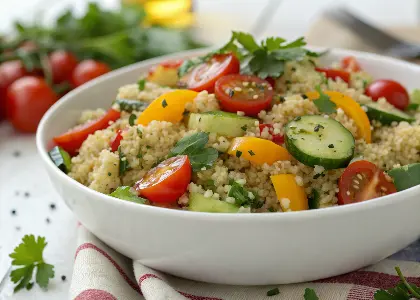
Day 5
Breakfast:
- Whole-Grain Toast with Mashed Avocado and Sliced Tomato: Whole grains and avocados both provide heart-healthy nutrients. Whole-grain toast (1 slice), mashed avocado (1/2), sliced tomato (1/4 cup)
Lunch:
- Quinoa Salad with Mixed Veggies and Feta: Quinoa is a whole grain that provides fiber and can help lower LDL cholesterol. Cooked quinoa (1/2 cup), diced cucumber (1/4 cup), diced bell pepper (1/4 cup), diced red onion (1 tbsp), feta cheese (1 oz), olive oil (1 tsp)
Dinner:
- Shrimp Stir-Fry with Snap Peas and Bell Peppers: Shrimp contains monounsaturated and polyunsaturated fats which can help lower cholesterol dramatically. Shrimp (4 oz), snap peas (1/2 cup), sliced bell peppers (1/2 cup), olive oil (1 tsp), minced garlic (1 clove)
Snacks:
- Berries with Cottage Cheese: Cottage cheese is low in saturated fat, and berries add antioxidants. Mixed berries (1/2 cup), low-fat cottage cheese (1/4 cup)
- Small Handful of Pumpkin Seeds: Pumpkin seeds provide fiber and sterols that support heart health. Pumpkin seeds (1/4 cup)
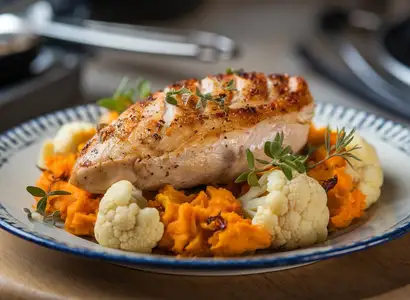
Day 6
Breakfast:
- Oatmeal with Walnuts and Apple Slices: Walnuts are a source of omega-3s and have been shown to lower LDL cholesterol. Oats (1/2 cup), almond milk (1 cup), walnut halves (1 tbsp), apple (1 small, sliced)
Lunch:
- Stuffed Bell Peppers with Black Beans and Brown Rice: Black beans and brown rice are high fiber foods that reduce how much cholesterol is absorbed into the bloodstream. Bell pepper (1 large), cooked black beans (1/2 cup), cooked brown rice (1/4 cup), diced tomatoes (1/4 cup), chopped cilantro (1 tbsp)
Dinner:
- Roasted Chicken Breast with Cauliflower and Sweet Potato Mash: Choose lean, skinless chicken for a protein-rich, low-fat meal. Skinless chicken breast (4 oz), cauliflower florets (1 cup), sweet potato (1 small, mashed), olive oil (1 tsp)
Snacks:
- Cherry Tomatoes with a Dash of Olive Oil and Pepper: Tomatoes are high in antioxidants, especially when paired with healthy fats. Cherry tomatoes (1 cup), olive oil (1 tsp), ground pepper
- Sliced Kiwi with Chia Seeds: Kiwi is rich in vitamin C, and chia seeds provide fiber and omega-3s. Kiwi (1 medium, sliced), chia seeds (1 tsp)
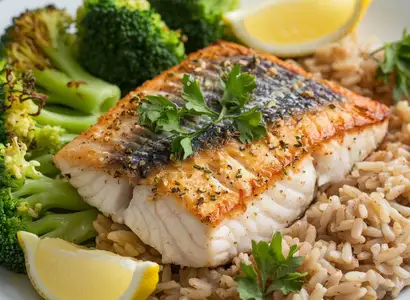
Day 7
Breakfast:
- Smoothie with Blueberries, Spinach, and Flaxseeds: This smoothie is packed with fiber and antioxidants. Blueberries (1/2 cup), spinach (1 cup), flaxseeds (1 tbsp), almond milk (1 cup)
Lunch:
- Chickpea and Spinach Stuffed Pita: Chickpeas are rich in cholesterol-lowering soluble fiber. Whole-grain pita (1 small), chickpeas (1/2 cup), spinach (1/2 cup), sliced cucumber (1/4 cup), tzatziki (1 tbsp)
Dinner:
- Baked Tilapia with Steamed Broccoli and Brown Rice: Tilapia is a lean fish with minimal saturated fat. Tilapia fillet (4 oz), broccoli florets (1 cup), cooked brown rice (1/2 cup), olive oil (1 tsp), lemon wedge
Snacks:
- Red Grapes and a Few Pecans: Red grapes have antioxidants that can help lower cholesterol. Red grapes (1/2 cup), pecans (1/4 cup)
- Edamame with Sea Salt: Edamame is high in fiber and plant-based protein. Edamame (1/2 cup, shelled), sea salt
How to Reduce Cholesterol in 7 Days
Here are some effective tips on how to lower cholesterol in 7 days:
- Increase fiber intake: Include foods like beans, lentils, oats, and fruits such as apples and citrus. Soluble fiber foods can help lower cholesterol levels.
- Choose Whole Grains: Opt for whole-grain bread, brown rice, and oats. These are high in soluble fiber, which can help reduce LDL (bad) cholesterol.
- Opt for Lean Proteins: Include fish (especially fatty like salmon, mackerel, or sardines 2-3 times a week), skinless poultry, and plant-based proteins like beans and tofu.
- Focus on Fruits and Vegetables: Aim for at least 5 servings a day. They are rich in antioxidants and fiber, which help lower cholesterol levels.
- Choose healthy fats: Use sources of unsaturated fats like olive oil, avocados, and nuts. Avoid saturated and trans fats found in fried and processed foods.
- Limit processed foods: Avoid packaged snacks, fast food, and sugary treats.
- Cut Back on Sugary Foods and Beverages: Reduce your intake of soda, sweets, and pastries. These can lead to weight gain and increased cholesterol levels.
- Add plant sterols: These compounds can help block cholesterol absorption. Look for products like fortified margarine, orange juice, or yogurt.
- Exercise daily: Incorporate aerobic exercises such as walking, cycling, or swimming. Regular exercise can help raise HDL (good) cholesterol and lower LDL cholesterol.
- Focus on Gradual Weight Loss: Even losing a small amount of weight (5-10%) can help lower cholesterol levels. Incorporate healthy eating habits and regular exercise to support weight loss.
- Reduce alcohol consumption: If you consume alcohol, do so in moderation. Limit to one drink per day for women and two drinks per day for men.
- Drink Plenty of Water: Staying hydrated supports overall health. Aim for at least 8 glasses of water a day.
- Aim for 7-9 Hours of Quality Sleep Each Night: Poor sleep can affect cholesterol levels and overall health. Establish a calming bedtime routine and create a comfortable sleep environment.
- Practice Stress-Reduction Techniques: High stress can negatively impact cholesterol levels. Consider mindfulness, meditation, yoga, or deep-breathing exercises to help manage stress.
Supplements to Lower Cholesterol
Always choose high-quality supplements from reputable brands to ensure safety and effectiveness and talk to your healthcare provider before starting any supplements.
Here’s the list of supplements to lower cholesterol:
- Omega-3 Fatty Acids: Omega-3s can help lower triglyceride levels and may increase HDL (good) cholesterol. They also have anti-inflammatory properties that benefit heart health.
- Psyllium Husk: This soluble fiber can help lower cholesterol by binding to cholesterol in the digestive system, promoting its excretion.
- Plant Sterols and Stanols: Plant sterols and stanols can block the absorption of cholesterol in the intestines, leading to lower levels of LDL cholesterol.
- Red Yeast Rice: This supplement may help lower LDL cholesterol levels, similar to prescription statin medications. It contains naturally occurring statins but should be used under medical supervision.
- Coenzyme Q10 (CoQ10): CoQ10 can help support heart health, especially for those taking statins, which can deplete CoQ10 levels in the body.
- Fiber Supplements: Supplements high in soluble fiber can help lower LDL cholesterol and improve overall heart health.
- Niacin (Vitamin B3): Niacin can help raise HDL cholesterol and lower LDL cholesterol and triglycerides, but it should be used under a doctor’s supervision due to potential side effects.
- Artichoke Leaf Extract: Some studies suggest that artichoke leaf extract may help lower total and LDL cholesterol levels.
- Garlic Extract: Garlic may have a modest effect on lowering cholesterol and improving heart health due to its anti-inflammatory properties.
- Curcumin: Found in turmeric, curcumin has anti-inflammatory and antioxidant properties that may help improve lipid profiles and reduce cholesterol levels.
Conclusion
Embarking on a low cholesterol diet doesn’t mean sacrificing flavor or enjoyment in your meals.
With this 7-day low cholesterol meal plan and the list of foods to lower cholesterol, you’re well-equipped to make heart-healthy choices.
Remember, consistency is key, and combining a healthy diet with regular exercise can significantly impact your cholesterol levels and overall health.
Always consult with your healthcare provider before making significant changes to your diet, especially if you’re on medication or have existing health conditions.
- Hashimoto’s diet meals for beginners
- 20/4 intermittent fasting meal plan
- Low oxalate diet for kidney stones
- 7-day insulin resistance diet plan
- Health benefits of apple cider vinegar
- The best foods for osteoporosis or bone health
- Best foods for rheumatoid arthritis
- 15 foods to avoid with gallbladder stones
- 7-day anemic diet plan
- Healthy diet for type 2 diabetics
- What to eat on a no sugar diet
Frequently Asked Questions
What does low cholesterol mean?
Low cholesterol typically refers to having total cholesterol levels below 200 mg/dL, with LDL (bad) cholesterol below 100 mg/dL and HDL (good) cholesterol above 60 mg/dL.
What happens if your cholesterol is too low?
While rare, very low cholesterol levels (below 160 mg/dL) may be associated with depression, anxiety, and in some cases, increased risk of hemorrhagic stroke. However, for most people, lower cholesterol is generally better for heart health.
What meats are low in cholesterol?
Lean meats like skinless chicken breast, turkey breast, and lean cuts of beef (sirloin, flank steak) are lower in cholesterol. Fish, especially fatty fish like salmon, is also a good choice.
What ice cream is low in cholesterol?
Non-dairy ice creams made from soy, almond, or coconut milk are typically lower in cholesterol, as they do not contain animal fats which raise cholesterol levels.
Are bananas OK for low cholesterol diet?
Yes, bananas are excellent for a low cholesterol diet. They are naturally low in fat and high in soluble fiber, which can help lower cholesterol levels.
Are eggs bad for cholesterol?
While eggs do contain cholesterol, they don’t significantly impact blood cholesterol levels for most people.
Moderate consumption (1-2 eggs per day) is generally safe but those with existing high cholesterol may want to consume them in moderation.
What is the best drink to lower cholesterol?
Green tea is one of the best drinks to lower cholesterol, as it contains antioxidants that help reduce LDL cholesterol and promote heart health. Other options include pomegranate juice and water.
